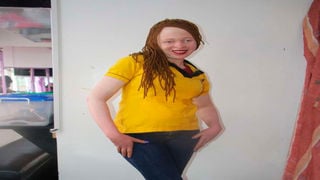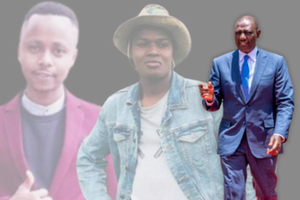
Catherine Wangui Njuguna, 27, a Nairobi-based beautician living with albinism. The mother of one was born and raised in Githunguri, Kiambu County.
| PoolSaturday Magazine
Premium
Beauty beyond the screen: Life through the lens of a young albino woman
What you need to know:
- When Catherine Wangui Njuguna was born 27 years ago, people were shocked that she was an albino as there was no known history of albinism in the family
- She has battled stereotypes and bias, but through the love and support of her family and the Albinism Society of Kenya community her life is fulfilled
"There is no history of albinism in my family and so it came as a shock to my family and relatives when I was born with the condition. My father has been my greatest support system and has walked with me since I was born. He always protected me from the social stigma linked with albinism and always assured me that I was beautiful. This has been my greatest source of hope.
I was born and raised in Githunguri, Kiambu County. I grew up having parents and siblings who were very loving and this birthed confidence in me. Unfortunately, when I went into society and I looked at the media space, I was not represented as beautiful. To some extent, I started developing inadequacy, as people took quite a while to understand my beauty and accept that my eyebrows and eyelashes are pale, and my hair is curly and blonde as opposed to curly and black.
I had to cultivate a sense of 'enoughness' which freed me from the validation of society and what the ideals of beauty are perceived to be. My father always assured me that, am his favourite in the family and he showered me with gifts and love messages. I always felt relief being at home where I felt accepted and loved.
With my family support, I acquired education from Thika School for the Blind, and eventually, my father suggested I join Kahurira Secondary school Githunguri to be near him. Life took a different route when I Joined Secondary school as I became the subject of ridicule and became introverted. I recall students staring at me and telling me that I looked weird. Some students avoided touching me because of the myth that, if they touched me they would be like me.

Catherine Wangui Njuguna, 27, a Nairobi-based beautician living with albinism. The mother of one was born and raised in Githunguri, Kiambu County.
I faced all forms of discrimination in school which really affected my self-esteem. Luckily, the head teacher realised that students were avoiding me and this pushed him to create awareness about albinism. I remember him telling students that I am just like them and issued a warning that anyone who would mistreat me would be expelled. At last, I felt a sense of belonging.
Dating and finding "the one" can be hard for most people, and albinism can add some unique challenges to fully understand the language of love. After High school, I got involved in exploring romance, intimacy, and sex. At the age of 21 years, I got pregnant and this shocked me because I thought people living with albinism could not conceive. When I became pregnant, the father of my baby abandoned me as he thought that I would birth an albino baby. The pregnancy journey was tough and full of anxiety as I too thought the same.
I didn't want my child to re-live my experience, so I desired a baby without albinism. The myths associated with albinism have a profound influence on the lives of people with the condition. The beliefs and superstitions are deep-rooted.
My daughter who is now six was born without the condition.
The father of my baby was shocked when he heard the baby was without the condition. He came back begging to take the child as he believed with time, the baby would be an albino. There is a myth that albinism is contagious. My family ensured that my baby was safe. When I look at my daughter, I smile knowing that indeed, there is a God in heaven who hears our prayers. In most cases, my daughter always asks me why I am different from the rest of the parents, and I always tell her that, "I am mzungu" a name that has been embraced by her peers.
I have struggled with low self-esteem, self-absorption, and I have had to battle myths. In 2017, I was introduced by a friend to the former nominated senator Hon. Isaac Mwaura, the core founder of Albinism Society of Kenya (ASK). I have learnt so much from him and this has truly shaped me to be a very confident woman who is never intimidated by what people think. Through ASK, I was introduced to Beauty Point College where I got a scholarship to pursue beauty therapy for seven months. The course made me understood that beauty enhances the value and that there is beauty beyond the screen. I am equipped with skills that have enabled me to venture into entrepreneurship. I offer mobile salon services at an affordable cost and I use that money to raise my daughter.
I would encourage people with albinism to accept themselves and go forth and pursue their God-given abilities. It is key to see beauty beyond the screen."
Sidebar:
Tackling myths and superstitions on albinism
"They're cursed. Their families are being punished by ancestral spirits. Their body parts make potent charms for riches and success. Their blood imparts magical powers. They're less intelligent, or sterile. They don't die, but simply vanish." These are just the many myths and stereotypes surrounding albinism.
This year, International Albinism Awareness Day was marked on June 13. Still, it's worth reflecting on the terrible – and sometimes lethal – myths, superstitions, and stereotypes (as well as many others) about people with albinism, and how we can each play a part in exploding them.
Albinism is a genetic condition that is caused by a recessive gene, carried by both of a person's parents. That person's body then has little or no ability to produce melanin, which colours their skin, hair, and eyes. An estimated 3,000 people are living with albinism in Kenya. The Albinism Society of Kenya brings together and assists people with albinism to live dignified lives.
Feedback to the editor: [email protected]




